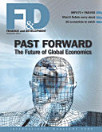Finance & Development, September 2012
International Monetary Fund. External Relations Dept.
ago 2012 · International Monetary Fund
3.0star
1 opiniónreport
Libro electrónico
60
Páginas
reportLas calificaciones y opiniones no están verificadas. Más información
Acerca de este libro electrónico
Technology is generating a global convergence. A "big bang" of information—and education as well—is improving human lives. And with global interconnectivity growing by leaps and bounds, we are all witness to a rapid spread of information and ideas. But, as we have seen from the prolonged global financial crisis, our interconnectedness carries grave risks as well as benefits. This issue of F&D looks at different aspects of interconnectedness, globally and in Asia. • Brookings VP Kemal Devis presents the three fundamental trends in the global economy affecting the balance between east and west in "World Economy: Convergence, Interdependence, and Divergence." • In "Financial Regionalism," Akihiro Kawai and Domenico Lombardi tell us how regional arrangements are helping global financial stability. • In "Migration Meets Slow Growth," Migration Policy Institute president Demetrios Papademetriou examines how the global movement of workers will change as the economic crisis continues in advanced economies. • "Caught in the Web" explains new ways of looking at financial interconnections in a globalized world. • IMF Managing Director Christine Lagarde provides her take on the benefits of integration and the risks of fragmentation in "Straight Talk." Also in this issue, we take a closer look at interconnectedness across Asia as we explore how trade across the region is affected by China's falling trade surplus, how India and China might learn from each others' success, and what Myanmar's reintegration into the global economy means for its people. F&D's People in Economics series profiles Justin Yifu Lin, first developing country World Bank economist, and the Back to Basics series explains the origins and evolution of money.
Calificaciones y opiniones
3.0
1 opinión
Califica este libro electrónico
Cuéntanos lo que piensas.
Información de lectura
Smartphones y tablets
Instala la app de Google Play Libros para Android y iPad/iPhone. Como se sincroniza de manera automática con tu cuenta, te permite leer en línea o sin conexión en cualquier lugar.
Laptops y computadoras
Para escuchar audiolibros adquiridos en Google Play, usa el navegador web de tu computadora.
Lectores electrónicos y otros dispositivos
Para leer en dispositivos de tinta electrónica, como los lectores de libros electrónicos Kobo, deberás descargar un archivo y transferirlo a tu dispositivo. Sigue las instrucciones detalladas que aparecen en el Centro de ayuda para transferir los archivos a lectores de libros electrónicos compatibles.








